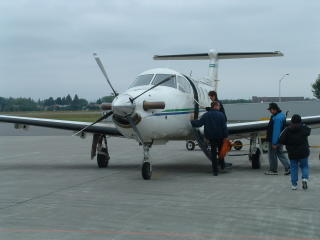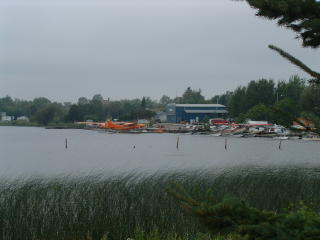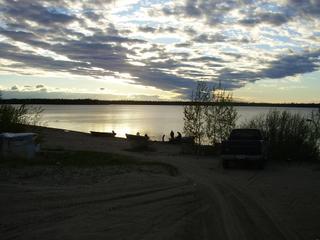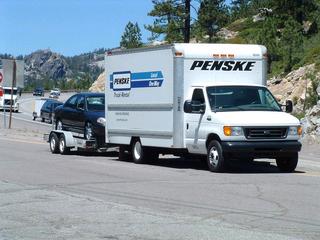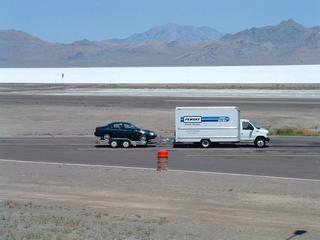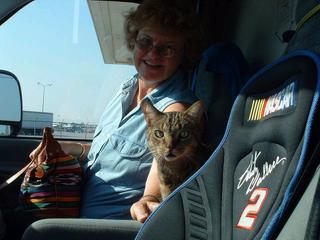
Reflections on week one
Ricardo wrote such a newsy email, that I thought it should be posted. These are his words:
We have already settled down in our house which is a somehow modern, fully-furnished bungalow of about 900 SQ ft, consisting of two bedrooms and a small deck. We have cable TV (satellite, some 30 channels and free movies), good telephone services, hot water and heating. The internet access is dial up, but at the school there is wireless broadband available and we both have laptops. It is a good walk from home to the school and we don’t have any transportation. But today we got the school truck (a Ford F-150 4X4).

People in town move, during the summer, in Honda four-wheelers (must be over 100 of these) and there are several pick-up trucks (probably around 30 of those). The streets are sandy; it is whitish sand with a high content of clay. The surroundings and streets are not particularly dirty or clean. The natives know this is their land, no doubts about that. However, they don’t keep it to high standards of cleanliness, which I found a little disappointing since I had studied about their love for and harmony with nature. The reality reminded me of certain “barrios” in Buenos Aires, New York or San Pablo. Papers, plastic bottles, cardboard boxes flying around… I recognize I am a bit of a stickler for clean and organized places but one gets used to it fast.
Almost every family has a boat, normally a Lund with a 20-30 hp engine or a canoe. The Wunnumin First Nations Band consists of about 110 families and a total of 570 people (about 500 of stable population). If you look it up in the internet, be aware that the name is written with single m informally and with double mm for mapping and official communications. There is a modern health centre with two nurse practitioners, and there are no doctors in town. But a nurse practitioner in Canada is almost as good (some people would say even better) than a doctor. They will fly you to Sioux Lookout if needed, by air ambulance; a Dentist comes to town every month. Street dogs are usually big huskies (sled dogs). Other wildlife around includes flies, mosquitoes, huge crows, different types of birds (loonies, ducks, etc), few black bears, beavers, wolves and moose. They tell me the fishing is great, but I haven’t had a chance to try it.
I find the locals a bit dry at first contact; they investigate and measure you up, in silence. They seem to have a great sense of humor. Over here silence is comfortable and if there is no reason is not broken as a rule. No one spends much time in small talk at all. Here, as a rule, no empty promises are made. If someone doesn’t know the answer to a question the answer is a plain: “I don’t know”. Greetings are a simple nod of the head, meaning “I see you”. No goodbyes are used: “I’ll see you” is used instead, or you just calmly go about your business when you’re done. Some people, especially kids, drop by your house and expect to just enter and visit. No previous phone calls. The people environment reminds me of villages out in the country in Argentina. These folks here are much like the gauchos in the pampas. This is a dry area so there is no alcohol anywhere, homes or stores.

Food is horribly expensive, I estimate (for two people and a cat) about $1,200 a month. There is one store in town (see above), so not much competition takes place; also, remember everything comes by air. Yep, this is a fly-in community: the pastor, the doctor, the dentist all arrive by air. The weather is not picnic either, so far we have been lucky, no ‘white- knuckle’ flights, but we’ve been told it gets dicey. During the winter there is one road open as the lake freezes, but it is not for the faint-of-heart, and there are no gas stations and no CAA to assist you if you run into trouble. There is one police officer in town and his assistant. I met with the Chief of the Band, Archie W. We looked at each other in silence for about 5 minutes as he was busy at his computer, then he said “I will see you some other time”, I left hoping that was a good sign.
 Carol has started at school with great energy and things are getting done fast. She has developed a style that projects a firm and professional yet friendly predisposition. She doesn’t have an easy job: there is vandalism and there are disciplinary problems. Most kids don’t have a clear picture of self or their future. They do speak their language (Oji-Cree or Ashininimowiin) all the time, and this is a beautiful captivating tongue, which Carol and I intend to learn. The informal network here works incredibly fast [“pueblo chico, infierno grande” or “small town, big hell”]. Carol was at the radio station delivering a message to the community and I went to the post office where five boxes with some of our belongings had arrived. They already knew my name, I offered my drivers’ license to id myself and the young lady at the counter said “Ricardo Pickering… right? Isn’t your wife the new principal? Hence, no need for id. Anyways, you must be getting the picture. These are rough surroundings yet it seems these proud people of the Nishinawbe-Aski Nations don’t waste time in speculations or pleasantries. So far, we feel reasonably accepted, are reasonably safe and live reasonably comfortable. I had the chance to talk to over a dozen youngsters from grades 5 to 10 and I find them reserved, not overly respectful but again not too disrespectful, and coping as well as they can with their socio-economic realities. They are not accepted as equals by the rest of Canadian society (the “whites” or Christians) and, accordingly, they don’t expect much. They are proud and calm people without too much expectation for the future. But the government of Canada assistance is not shy. It is as if the Canadian authorities recognized the shortcomings taken place during the negotiations of the treaties in 1877 (treaty 9 in this neck of the woods) and they had offered loans, welfare and assistance almost to generosity levels. Still, life is hard and there are some suicides, recently a 21 year old boy passed away in this unfortunate way. If Carol and I can do anything about it, and with the help of teachers and others the youngsters would slowly get a brighter appreciation of the possibilities the future offers in what I’m convinced is one of the best five countries in the world. They would also get the clear message that us (and I know you would too) accept them as equals, with no strings attached. Well, I have written enough for this one.
Carol has started at school with great energy and things are getting done fast. She has developed a style that projects a firm and professional yet friendly predisposition. She doesn’t have an easy job: there is vandalism and there are disciplinary problems. Most kids don’t have a clear picture of self or their future. They do speak their language (Oji-Cree or Ashininimowiin) all the time, and this is a beautiful captivating tongue, which Carol and I intend to learn. The informal network here works incredibly fast [“pueblo chico, infierno grande” or “small town, big hell”]. Carol was at the radio station delivering a message to the community and I went to the post office where five boxes with some of our belongings had arrived. They already knew my name, I offered my drivers’ license to id myself and the young lady at the counter said “Ricardo Pickering… right? Isn’t your wife the new principal? Hence, no need for id. Anyways, you must be getting the picture. These are rough surroundings yet it seems these proud people of the Nishinawbe-Aski Nations don’t waste time in speculations or pleasantries. So far, we feel reasonably accepted, are reasonably safe and live reasonably comfortable. I had the chance to talk to over a dozen youngsters from grades 5 to 10 and I find them reserved, not overly respectful but again not too disrespectful, and coping as well as they can with their socio-economic realities. They are not accepted as equals by the rest of Canadian society (the “whites” or Christians) and, accordingly, they don’t expect much. They are proud and calm people without too much expectation for the future. But the government of Canada assistance is not shy. It is as if the Canadian authorities recognized the shortcomings taken place during the negotiations of the treaties in 1877 (treaty 9 in this neck of the woods) and they had offered loans, welfare and assistance almost to generosity levels. Still, life is hard and there are some suicides, recently a 21 year old boy passed away in this unfortunate way. If Carol and I can do anything about it, and with the help of teachers and others the youngsters would slowly get a brighter appreciation of the possibilities the future offers in what I’m convinced is one of the best five countries in the world. They would also get the clear message that us (and I know you would too) accept them as equals, with no strings attached. Well, I have written enough for this one.
 Another poingt of interest, the large red/yellow aircraft is from the Ministry of Natural Resources a water bomber, these aircraft are famous worldwide and can reload water by scooping it from a lake, then they mix it with fire retardant and spread it over the forest fires. Enjoy!
Another poingt of interest, the large red/yellow aircraft is from the Ministry of Natural Resources a water bomber, these aircraft are famous worldwide and can reload water by scooping it from a lake, then they mix it with fire retardant and spread it over the forest fires. Enjoy!
